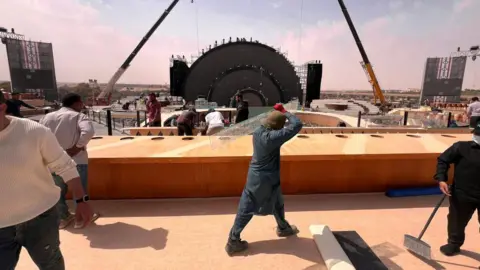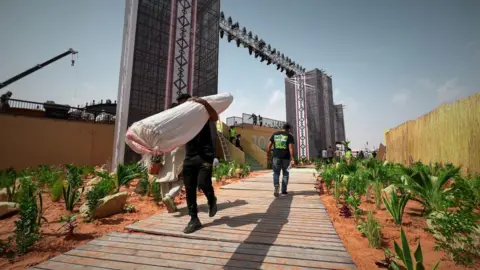ARTICLE AD BOX
Caroline Hawley
BBC Diplomatic Correspondent

 NurPhoto/Getty
NurPhoto/Getty
Human rights groups are warning of a "surge" of deaths of migrant construction workers in Saudi Arabia, as it prepares to host the World Cup in 2034.
Labourers are already dying from preventable workplace accidents in the country, according to Human Rights Watch and FairSquare which have both published reports today.
Many such deaths are wrongly classified as having occurred due to natural causes and the families of workers are not compensated, the reports say.
Both groups have called on the Saudi Authorities to ensure basic safety protections for the country's huge migrant work-force.
"The 2034 Saudi World Cup will be the largest and most expensive ever, but it could also have the highest cost in human lives, as millions of migrant workers build infrastructure, including 11 new stadiums, a rail and transit network, and 185,000 hotel rooms," Minky Worden, director of Global Initiatives at Human Rights Watch, said.
The warnings come a day after the President of FIFA, Gianni Infantino, visited the country along with Donald Trump - attending a US-Saudi investment forum.
FIFA – football's global governing body - says it has a "steadfast commitment to the protection and promotion of human rights in the context of its operations."
But Human Rights Watch has accused FIFA of failing to learn lessons from migrant worker deaths in the lead-up to the World Cup in Qatar in 2022.
Data on migrant deaths is hard to come by in a country where human rights groups have very limited access and labour unions are banned.
But Human Rights Watch interviewed the families of 31 workers from Bangladesh, India and Nepal who fell from heights, were crushed or decapitated by heavy machinery or were electrocuted.
Heat is another major concern, as Saudi Arabia ramps up construction work in preparation for hosting the 2034 tournament.
In March, a Pakistani foreman, Muhammad Arshad, was reported to have fallen from a construction site at a stadium being built in the eastern city of Al Khobar – the first death related to the World Cup.
Last year, the Saudi government said that there had been "tangible achievements" in occupational health and safety, with rates of deaths and injuries decreasing.
FIFA also praised "significant steps" taken by Saudi Arabia to reform its labour laws since 2018.
But the global construction worker's union, BWI, said there had been an "alarming rise" in accidents that could have been prevented.
"These are the result of systematic negligence, corruption and inadequate oversight and accountability," said BWI General Secretary, Ambet Yuson.
And Saudi medical authorities rarely conduct autopsies to establish the exact cause of migrant workers' deaths, according to FairSquare.
"Hundreds of thousands of young men, many of whom have young families, are being pitched into a labour system that poses a serious risk to their lives, a medical system that doesn't have the capacity to determine the cause of their deaths, and a political system that doesn't appear to either protect them or find out how they died, let alone compensate the families shattered by Saudi Arabia's negligence," FairSquare co-director James Lynch said.
He described FIFA's human rights policies as a "sham."
"While FIFA praises Saudi Arabia to the rafters and highly-paid western law firms generate vast profits for curating Saudi's reputation, children in places like Nepal grow up without their fathers and never even learn how they died, he said."

 NurPhoto/Getty Images
NurPhoto/Getty Images
The Saudi government says there have been improvements to its occupational health and safety, but rights groups are sceptical of the changes
FIFA told Human Rights Watch that it plans to establish a workers' welfare system dedicated to mandatory standards and enforcement mechanisms for World Cup-related construction and service delivery in Saudi Arabia.
In a letter it said: "We are convinced that the measures implemented to ensure construction companies respect the rights of their workers on FIFA World Cup sites can set a new standard for worker protection in the country and contribute to the wider labour reform process, helping to enhance protections for workers on World Cup sites and beyond."
But Human Rights Watch said no further details were provided on how the welfare system would work.
"Saudi authorities, FIFA, and other employers should ensure that all migrant worker deaths, regardless of perceived cause, time, and place are properly investigated and that families of deceased workers are treated with dignity and receive fair and timely compensation," the group said.
The BBC has approached the Saudi authorities for comment.

 3 months ago
99
3 months ago
99








 English (US) ·
English (US) ·